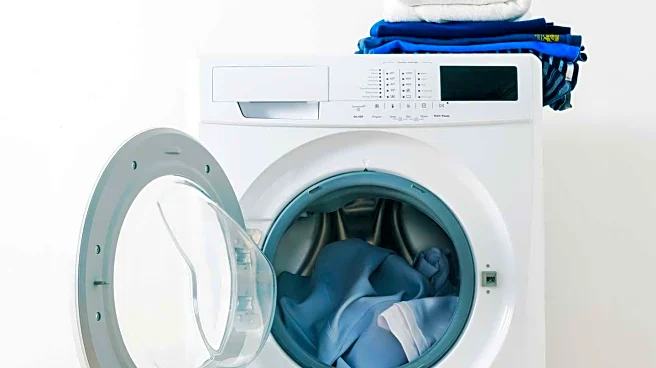What is the story about?
What's Happening?
Consumer Reports' laundry expert, Rich Handel, has provided new recommendations for more efficient laundry practices. He advises against using fabric softener and dryer sheets, as they can leave residues on clothes and interfere with the moisture sensor in dryers, potentially causing them to run longer. Handel suggests using high-performing detergents, such as Tide Plus Ultra Stain Release for tough stains, which costs 88 cents per load, or Costco's Kirkland Signature detergent for everyday messes at 14 cents per load. Additionally, he recommends using cold water for washing to save energy and preserve fabric colors, and utilizing the dryer's automatic cycle setting or opting for air drying methods like clotheslines to further reduce energy consumption.
Why It's Important?
These recommendations are significant as they offer practical ways to reduce household energy consumption and costs associated with laundry. By avoiding fabric softeners and dryer sheets, consumers can prevent potential damage to their appliances and clothing, leading to longer-lasting equipment and garments. The emphasis on using cold water and efficient detergents aligns with broader sustainability goals, reducing the environmental impact of laundry by minimizing energy use. This advice can help consumers make informed choices that contribute to both economic savings and environmental conservation.
What's Next?
Consumers may begin to adopt these practices, leading to a shift in purchasing habits towards more efficient detergents and away from fabric softeners and dryer sheets. Appliance manufacturers might respond by designing dryers with improved sensors that are less affected by residues. Additionally, there could be increased interest in eco-friendly laundry solutions, prompting further innovation in detergent formulations and energy-efficient appliances. Retailers may also adjust their product offerings to meet changing consumer preferences.
Beyond the Headlines
The advice from Consumer Reports highlights a growing trend towards sustainability in everyday activities. As consumers become more aware of the environmental impact of their choices, there is potential for broader cultural shifts towards eco-friendly practices. This could influence industries beyond laundry, encouraging more sustainable product designs and marketing strategies. The focus on reducing energy consumption and waste aligns with global efforts to combat climate change, underscoring the importance of individual actions in achieving collective environmental goals.
















